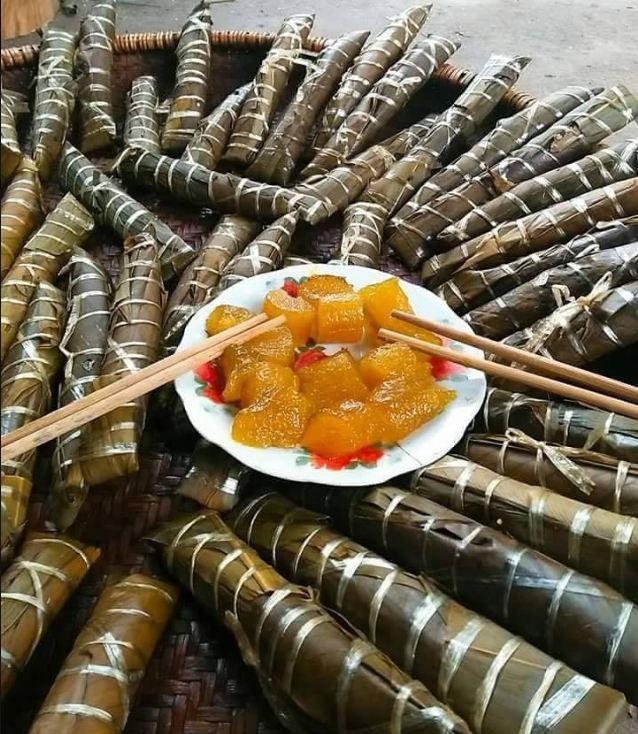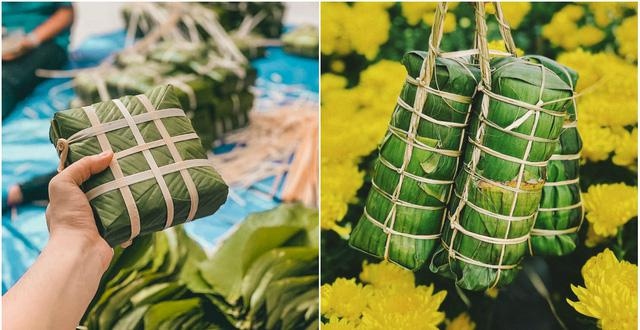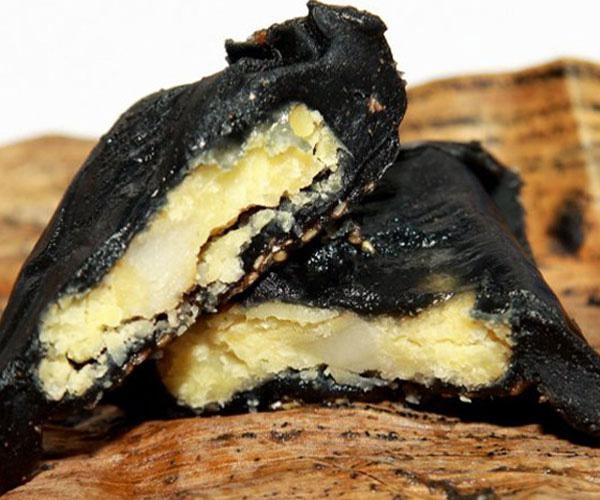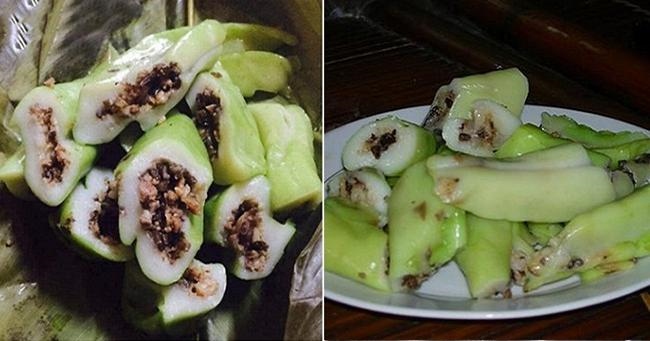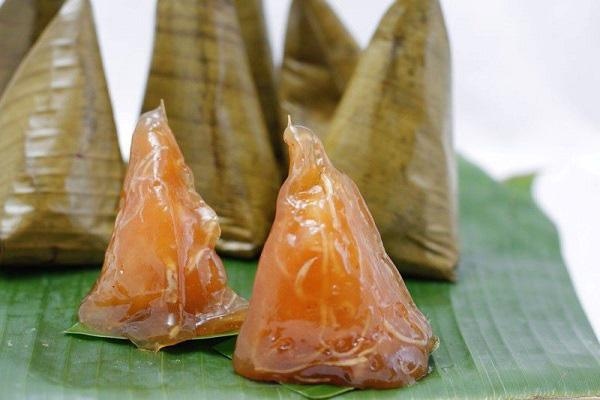5 famous leaf cakes of Vietnam
There are many types of cakes in Vietnam, with different styles and flavors.
Banh la, literally meaning "leaf cake", is a category of bánh, or Vietnamese cake, that consist of a parcel of a variety of rice stuffed with some fillings and wrapped inside a leaf or leaves. Below are the famous leaf cakes.
Tro cake - Rice cake with herbal ash
Vietnam is a country of cakes made from sticky rice. One of those is banh gio (or banh tro), a cake made from glutinous rice soaked in ash water.
The ingredients to make banh gio are simple: glutinous rice, ash liquor of clean straw, a little lime, banana leaves and molasses.
To get the fragrant ash liquid, people must burn clean straw and pour the ash into a basin, add a little lime to make the water deposit, and filter the water.
Meanwhile, the glutinous rice is washed, soaked in the ash water for about 3-4 hours and strained. The banana leaves are washed and steamed to make it soft and clean.
The cook must be very careful and skillful while putting the rice in the leave tidily, rolling up the leave, folding the leave’s edge tightly, then boiling the cake.
The cake needs to cool down to make it taste fresh.
The cake is then split into small pieces and used with molasses which is a soft and dark red sugar and flavors the aroma for banh gio.
The cake, which is unwrapped, looks attractive, soft in amber color. It smells like the ash of straw, making people reminisce about their warm and lovely village.
Chung and tet cakes
Banh Chung (square glutinous rice cake) is a traditional cake of Vietnamese people throughout the lunar New Year (Tet) holiday.
For Vietnamese, making Banh Chung is an ideal way to express gratitude to their ancestors and homeland.
Banh Chung was invented by the 18th prince of Hung King in a contest looking for his successor.
According to legend, 3,000-4,000 years ago, Prince Lang Lieu made round and square cakes, with the round Day cake symbolizing the sky and the square Chung cake, the Earth (under the ancient Vietnamese perception), as offerings on the occasion of Spring.
In ancient concept, the Earth is square; hence Banh Chung has a square shape to reflect the Earth.
Since the cakes he offered were of special meaning and delicious taste, Lang Lieu was selected to be the next king.
Since then, in honor of this, Vietnamese people always make and have this for Lunar New Year. Chung cake has become the most famous and irreplaceable traditional Vietnamese food of the Tet holiday.
This legend aims to remind the next generations of ancient tradition as well as the primary Chung cake. Besides, it emphasizes the important role of rice and nature in water rice culture.
In contrast to the fast food of modern times, the process of making Banh Chung is time-consuming and requires the joint work of several people.
The main ingredients are glutinous rice, pork, and green beans wrapped square in broad-blade leaves that will give the rice a green color after about 12 hours' boiling. The wrapping must be neither too tight nor too loose.
The food has a high level of nutrition with an original tasty flavor and may be kept for a long time. Eating Banh Chung with vegetable pickles will bring you an unforgettable taste.
In the traditional conception of Vietnamese people, the process of making Banh Chung is an opportunity for a family reunion. Sitting around the fire, family members tell one another past stories and prepare for a New Year with best wishes.
Nowadays, in some big cities, the lifestyle of modern society prevents people from preparing the cake, but the habit of worshipping the ancestors with it never changes. It is evidence of the loyalty and deep gratitude of Vietnamese people to their ancestors.
The Tet cake, which is popular in the south and central region of Vietnam, is made with sticky rice and filled with pork fat and beans seasoned with black pepper and shallots. It is considered a variant of Chung cake (square glutinous rice cake), which is more popular in the northern region.
Tro cake
Among Vietnamese traditional cakes, “banh gai” (glutinous rice cake blackened in a concoction of edible leaves) is perhaps the most multipurpose because it can be used as an offering at wedding ceremonies, as gifts at longevity parties, as a snack, appetizer, or even a dessert.
'Banh gai' is made all year round but mostly in spring and winter. And it can be preserved unspoiled for a long time.
The fragrant 'gai' leaves covered with smooth white down are an indispensable ingredient. Fresh leaves are washed, boiled, squeezed out and pounded. All stems must be removed. Then the dry leaves are mixed and grounded to powder.
High-quality glutinous rice is soaked in water for about two hours, sifted and then grounded to flour. Then, the rice flour is mixed with 'gai' powder in a 5:1 ratio, and ground peanuts and molasses are added. This mixture is used to prepare the cake crust.
The stuffing is made of green beans, coconut shreds, sugar-coated lotus seeds and banana attar. The cakes, sprinkled with sesame, are then wrapped in dry banana leaves. They are steamed for about one hour. 'Banh gai' is a tasty treat when served cool.
Te cake
Banh te, which literally means “rice cake”, is very simple. It is considered one of the most typical dishes in Hanoi, although it can be found in other parts of the country.
The cake is made from rice flour, wrapped in dong and banana leaves into a long, thin cylindrical shape and then steamed.
The ingredients to make banh te are very easy to find in the Red River Delta region of northern Vietnam, where rice farming is the main work.
They are plain, non-glutinous white rice, minced pork, wood ear, onion, salt and pepper.
To make the best banh te, it is important to have high-quality rice. Rice is first soaked in water until it is soft enough, then it is ground by hand with a grindstone to turn rice into a thick or watery mixture.
This mixture is stored in three or four days before being cooked to a not-too-hot temperature. It has to be stirred persistently until it becomes thick and gluey.
To make the filling, pork, onion and wood ear are minced and mixed with salt and pepper. The filling is then sautéed.
Dong and banana leaves are washed carefully before wrapping banh te. A layer of rice paste is placed onto a dong leaf, followed by a layer of filling, and then another layer of rice.
The cake is then wrapped with dong leaf, and another banana leaf before being tied with bamboo strings.
The last step involves steaming for 30 minutes until it is done.
The best banh te must be white and have the filling intact. The cake is best served when it is hot, and served with fish sauce.
It cake
Banh It is said to be one of central Vietnam’s specialties, which is commonly used not only in regional death anniversaries but marriage rituals as well. However, it has currently become a snack that can be tasted at any time.
It is said that Banh It includes two types: (1) the sweet one (called “Banh it la gai”) and (2) the salty one (called “Banh it tom thit”). They are both unique, appetising and attractive to many visitors to central Vietnam.
It is simply a mung bean paste ball which is covered by dough made from a mixture of ground “gai” leaves, sugar and sticky rice flour.
Sometimes, mung beans can be replaced by sweetened ground coconut. After banana leaves are folded into a cone shape, the cook will drop the ball into it and fold in four sides, creating a pyramid shaped cake. Lastly, the cake will be brought for steaming in order to make the cake a glossy deep black color stemming from “gai” leaves, a sweet taste of sugar, mung bean and glutinous rice, and a delicate aroma of banana leaves and “gai” leaves.
For the salty cake, minced pork meat, prawn, mashed mung bean, onion and seasonings are stirred fried until well-done and thick to make the filling. Additionally, the dough is only made of rice flour.
Traditionally, the cake could be either wrapped into banana leaves or not. Both types of Banh It are so mouthwatering and small that you can hardly imagine how fast you will try to relish the whole cake. Of course, tasting them gradually is much better.

